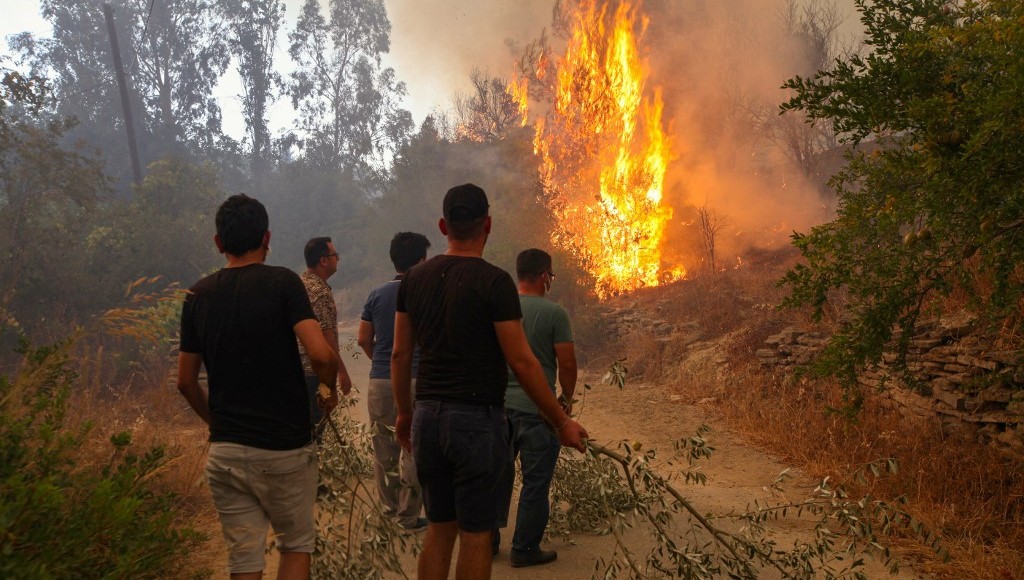The European Court of Human Rights (ECtHR) on Wednesday began hearing a case brought by six Portuguese youths against 32 nations including Turkey for not doing enough to stop global warming, the latest bid to secure climate justice through the courts, Agence France-Presse reported.
“The case concerns … the impact of climate change,” said Siofra O’Leary, president of the Strasbourg-based court’s 17-judge Grand Chamber, “resulting among other things in heatwaves and wildfires affecting the applicants’ lives and health.”
The youths, aged 11 to 24, say they are suffering from anxiety over their health and natural disasters.
Their move to file a complaint with the Strasbourg-based court was sparked by the devastating wildfires that struck Portugal in 2017, killing more than 100 people and charring swaths of the country.
Some plaintiffs claim allergies and breathing problems both during the fires and after, conditions at risk of persisting if the planet keeps warming.
“European governments are not managing to protect us,” said Andre Oliveira, 15, one of the six involved.
“We’re on the front lines of climate change in Europe: even in February it’s sometimes 30 degrees [Celsius, 86 Fahrenheit]. The heatwaves are getting more and more serious,” he added.
Andre and his fellow plaintiffs say the 27 European Union member states along with Russia, Turkey, Switzerland, Norway and Britain have all failed to sufficiently limit greenhouse gas emissions, affecting their life and health.
Turkey has been feeling the full force of climate change, with a rapid succession of floods and wildfires killing dozens of people and destroying large swathes of forest land over the past several years.
In concrete legal terms, they complain of infringements of their rights to life and respect for private life — Articles 2 and 8 of the European Convention on Human Rights.
More than 80 representatives and other lawyers for the states were present for the hearing’s opening, though Russia was not represented and the plaintiffs have withdrawn their complaints against Ukraine.
‘Priority’ case
The ECtHR is taking the case seriously, labelling it a “matter of priority” and passing it to the body’s top judges.
Two other climate cases involving France and Switzerland were examined by the ECtHR in March, though no rulings have yet been issued.
The Grand Chamber must first rule on the admissibility of the Portuguese case, since the youths filed directly to the ECtHR without first seeking recourse in domestic courts.
They argue that trying to file separate cases in all 32 countries would be an “excessive and disproportionate burden” on an issue requiring urgent attention.
But while acknowledging the importance of climate change in the abstract, lawyers for the states said the youths’ fight did not belong before the European court.
British representative Sudhanshu Swaroop said that as Portuguese citizens and residents, their case was Lisbon’s problem.
Meanwhile the youths “have not proved they have suffered harm,” Portuguese representative Ricardo Matos said.
“Their arguments are about the impacts of climate change, but they have not proved that they personally are victims. Simple conjectures are not enough.”
‘Seeking to evade scrutiny’
For their part, the plaintiffs’ lawyers say such arguments are typical of government responses in climate cases.
“It’s a pattern where they are seeking to evade scrutiny of their climate policies by focusing solely on the admissibility criteria,” said Gearoid o Cuinn, director at the Global Legal Action Network (GLAN).
“None of them have refuted the evidence that we’ve put forward that their policies are leading to three degrees of warming or more,” he added.
Nevertheless, “we’re hopeful the court has sent a lot of positive signals to date,” o Cuinn said.
“The best outcome is a finding that these 32 countries have violated the rights of these individuals and for the court to issue a legally binding decision that would require them to change their policies, to enact deep and urgent cuts to greenhouse gas emissions.”
It will likely be several months before the court decides whether it can hear the case.
Until now, the court’s environmental decisions have not covered global warming, dealing with issues like natural disasters and industrial pollution.
Activists are increasingly turning to courts to force greater efforts by governments to tackle climate change amid warnings the world is falling short of the 2015 Paris Agreement goals for limiting warming to 1.5 degrees Celsius above mid-19th century levels.
In August a court in the US state of Montana ruled in favor of a group of youths who accused it of violating their rights to a clean environment.
“The big advancement in the past couple of years was clarifying that this connection between human rights and climate change is very obvious, very clear,” said Maria Antonia Tigre, co-author of a report on climate litigation published by the University of Columbia’s Sabin Center for Climate Change Law.
“We can use human rights law … to force further action from states and from corporations,” she said.

